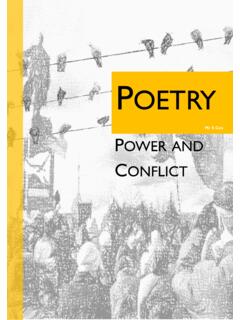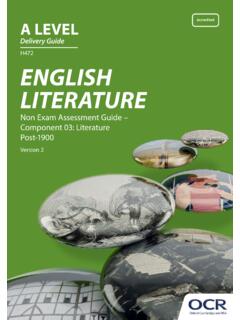Transcription of Macbeth: Revision Guide - The Bicester School
1 Macbeth: Revision GuidePlotAct1: Macbeth and Banquo meet witches, Cawdor executed, Lady M reads letter, taunts M, Duncan arrivesAct 2: M kills Duncan, Malcolm flees, M crownedAct 3: Banquo suspects M, murder of B, Fleance escapes, M haunted by B s ghost at a banquetAct 4: Witches show M future kings sons of Banquo, Macduff s family murdered, Malcolm says he is dishonest to test Macduff s loyaltyAct 5: Lady M sleepwalks, dies, Macduff kills M, Malcolm restored as KingMacbeth Knowledge OrganiserCharactersMacbethLady MacbethThe Three WitchesBanquoKing DuncanMalcolmMacduffLady MacduffFleanceHecateLennoxRossThe MurderersPorterDonalbainThemesAmbitionPo werVersions of RealityFate and FreewillGenderSupernaturalViolenceTimeDr amatic/Stylistic DevicesSoliloquyOne character speaking to audience; M uses to make audience complicitDramatic ironyAudience knows more than characters; audience knows D will die HamartiaTragic flaw; M s could be easily influenced/ambitionHubrisPride; M could be said to have this or Lady MCatharsisPurgation of pity and fear.
2 Happens at the endAnagnorisisRecognition or the tragedy to comePeripetieiaSudden reversal of fortuneRhymeUsed by the witches to create chant-like, supernatural atmosphereGothic linksMadnessLady M and M driven to madnessTransgressionAgainst natural order/divine right of kings/sexualitySupernaturalWitches; ghost; hallucinationsSettingDarkness; castle; set in the pastViolence and bloodStarts with battle; Cawdor s execution; King s & Banquo s murders; final battleDesireUnnatural desiresExploitationWitches exploit Macbeth and trick himFearConstant uncertainty and riskInevitabilityDoomed from the start; tragic?Plot Situation In the beginning we meet (or hear about) our characters: King Duncan is a nice old man who was going to be taken advantage of by traitors; Macbeth is a courageous war hero who defends his king, his country, and his honor.
3 Sweet! Time for a heroic action flick, right?Conflict Enter Three Witches Not so much. Along come three pesky witches/ sisters/ fates who announce that Macbeth is going to become King of Scotland. He's stoked, but quickly realizes the problem: if he's going to become king, someone else is going to have to not be king. Like the current king Duncan, and Duncan's sons, Malcolm and The King is Dead; Long Live the King With a little spurring from Lady Macbeth, Macbeth kills the king to secure the kingship. (That must have been quite a "honey-do" list.) It immediately becomes clear that the only way to hide the murder is to keep murdering, which means that the body count begins to Ghost Hunters A friendly little visit from the ghost of his murdered friend Banquo sends Macbeth into a raving fit, bringing a quick end to the banquet Macbeth has thrown together to celebrate his new kingship.
4 We suspect that things are about to go quickly Power Hungry Macbeth visits the weird sisters, who tell him some cryptic things that he interprets as: "It's cool; no one can defeat you." But, what's this? Forces lots of forces, but King Duncan's son Malcolm are gathering in England to fight his Fool Me Twice, Shame on Me To the surprise no one, it turns out you can't trust witches' tales to help you out in any way. It looks like Macbeth is going to be defeated, and he goes out committed to dying soldierly I Am No Man The last part of the prophecy fulfilled, Macbeth stands against a man not-of-woman-born. Still he fights, but good prevails over tyranny and madness. He's killed, Malcolm is named the rightful king, and everyone goes off to party at the coronation MacbethThe Three WitchesBanquoKing DuncanMalcolmMacduffLady MacduffFleanceHecateLennoxRossThe MurderersPorterDonalbainCHARACTER TABLEKey & FreewillCAPTAIN And Fortune, on his damn d quarrel smiling, Show'd like a rebel's whore.
5 But all's too weak; For brave Macbeth (well he deserves that name) Disdaining Fortune, with his brandished steel, Which smoked with bloody execution, ( )Basically, the captain says here that Macbeth should have died in battle but he was stronger than his fate. If this is true, then Macbeth has no one to blame but himself. But notice that the captain calls Macbeth "damned quarry": Macbeth may escape fortune this time, but that "rebel's whore" will get him in the end. (Hey, Shakespeare's words, not ours.)FIRST WITCHAll hail, Macbeth! Hail to thee, Thane of Glamis!SECOND WITCHAll hail, Macbeth! Hail to thee, Thane of Cawdor!THIRD WITCHAll hail, Macbeth, that shalt be king hereafter! ( )Million-dollar question: are the witches (1) playing on Macbeth's ambition and planting the idea of murder in his head; (2) really privy to some secret info about the way things are going to go down; or (3) actually controlling fate in some way?
6 BANQUO Look, how our partner's rapt. ( )"Rapt" comes from the Latin word "raptus," which means to be "seized" or "kidnapped." (Brain snack: It's the same word that gives us "rape," which clues you into the way that women were viewed as property rape was a crime against a man's property rather than a crime against a woman.) But back to the play: if Macbeth is "rapt," then he's been "seized" by something outside of his control. Does that mean we let him off the hook?PowerTHIRD WITCH All hail, Macbeth, thou shalt be king hereafter![..] Thou shalt get kings, though thou be all hail, Macbeth and Banquo! ( ;70-71)Tra-la-la, there goes Macbeth innocently walking along when all of sudden the witches show up to tempt him by talking about the awesome power that's going to be his.
7 Right? Or are they just giving voice to his secret desire?MACBETHIf good, why do I yield to that suggestion Whose horrid image doth unfix my hair And make my seated heart knock at my ribs Against the use of nature? Present fears Are less than horrible imaginings. My thought, whose murder yet is but fantastical, Shakes so my single state of man That function is smothered in surmiseAnd nothing is but what is not. ( )History Snack: Regicide was a pretty common occurrence in 11th century Scotland, the time period of Macbeth,but it definitely was not common in early 17th century England. The Divine Right of Kings said that monarchs were God's appointed representatives on earth, so rebellion wasn't just treason it would actually send you straight to hell.
8 James even wrote about it in The Trew Law of Free Monarchies (1598), where he claimed that "The state of monarchy is the supremest thing upon earth; for kings are not only God's lieutenants upon earth, and sit upon God's throne, but even by God himself are called gods." In other words, DUNCAN: My plenteous joys, Wanton in fulness, seek to hide themselvesIn drops of sorrow. Sons, kinsmen, thanes,And you whose places are the nearest, knowWe will establish our estate uponOur eldest, Malcolm, whom we name hereafterThe Prince of Cumberland; which honor mustNot unaccompanied invest him only, But signs of nobleness, like stars, shall shineOn all deservers. From hence to InvernessAnd bind us further to you.
9 ( )When King Duncan names his son, Malcolm, the Prince of Cumberland, he's essentially naming him the heir apparent to the throne. Fun fact: he's seriously out of order here, since Scotland was an elective monarchy at the time. This is all Macbeth needs to decide that Malcolm and King Duncan are nothing but an obstacle in his path to ultimate of RealityDUNCAN There's no artTo find the mind's construction in the was a gentleman on whom I built An absolute trust. ( )Here, King Duncan says that the former Thane of Cawdor (who turned out to be a traitor) seemed to be a "gentleman" he could "trust"; ergo, it's impossible to know a man's mind by reading his face.
10 Um, Duncan? Maybe you should listen to yourself and stop putting all your trust in the next treacherous Thane of So foul and fair a day I have not seen. ( )Hmm. This sounds familiar. Didn't the weird sisters just say almost the exact same thing? Has Macbeth seen this play before, or does he already have some kind of psychic connection with the weird sisters?ALL Fair is foul, and foul is fair;Hover through the fog and filthy air. ( )Clearly, Shakespeare's been traveling to Beijing. (Rim shot.) Unfunny jokes about pollution aside, the witches set us up here to mistrust everything. In the fog, it's hard to tell what's really there. Are they even there?AmbitionBANQUO [..] My noble partner You greet with present grace and great prediction Of noble having and of royal hope, That he seems rapt withal.











